Beep Baseball: Wayland players help blind citizens play the game
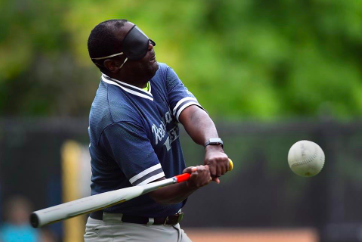
Credit: Courtesy of Christopher Evans from the Boston Herald
A player on the Boston Renegades beep baseball team takes a cut to make contact with the ball. “It feels good knowing that I can apply something that I know, which is baseball, because they are pretty similar, the swings are the same, and it feels good that I can help out people who really do need as many coaches as they can,” junior Josh Schreiber said.
October 16, 2019
Since the sport beep baseball was created in 1976 to allow the visually impaired to play on a real baseball team, it has spread across the globe, opening opportunities for millions despite their disability. Beep baseball is a form of baseball that uses a ball and bases that beep to allow blind people to play. Wayland varsity baseball players, junior Josh Schreiber and senior Gavin Moser, have dedicated hours to the local beep baseball team, the Boston Renegades, offering their knowledge of the sport and helping coach the player’s techniques.
“They use a ball that is the size of a softball but it has a beeper inside of it, so when you unplug a pin, the ball starts beeping,” Schreiber said. “The pitcher will time up the pitch with the batter, and the batter will have some[thing] that they listen to to start their swing. There are two bases that are like tackling dummies in football and they also have a beeper in it. As soon as the hitter makes contact, one of them will randomly start beeping, and the hitter has to run and hit the base.”
Players wear blindfolds in beep baseball to ensure that all players have an equal experience, as some of them are not completely blind. While in normal baseball, the hitter focuses on their swing based on when the ball is thrown, beep baseball players use sounds and timing with the pitcher to try and make contact with the ball due to the lack of vision. The coaches help the players time their swings correctly and master the form.
“Gavin and I are both hitting coaches, and we also occasionally catch,” Schreiber said. “So for hitting coaches, we are really just looking at all of the player’s swings and trying to help them out as much as possible. They all have a different goal and we have to get to know their swing and what their goals are and try to fix it. So if they need to work on their power, we’ll do something with that.”
Schreiber heard about the team a few years ago when his family friend’s husband was on the team, and he decided to officially join the team this year as a coach and invited Moser to go along with him.
“I help with the actual baseball part of it, the swinging mechanics and hitting drills because most of them have never played baseball before and [some of the] coaches also haven’t played baseball,” Moser said.
The practices are in Watertown at Filippello Park, and both Schreiber and Moser attend practice to coach once or twice a week. Many of the players did not play baseball when they were younger, so the coaches spend a lot of time helping them learn the game.
“I think it’s pretty fun [helping them] because they didn’t play sports growing up so it’s cool to see them be a part of a team and have that environment where they can just work together with a bunch of different people,” Moser said.
Because both the fielders and the batters only use sounds to track the ball, the coaches facilitate the fielders by informing them where the ball is going as the players listen to the beeping of the ball.
“The opposing team is lined up in a formation where one of the coaches will yell out a number that says what position of the field the ball is in, and the fielders will try to listen to the ball to stop it and gather it,” Schreiber said.
The Boston Renegades team itself started recreationally in 2000 and became a competitive team in 2002. It was the first real nationally competitive beep-ball team in all of New England. Rob Weissman from Woburn, MA is the head coach and has coached the team for over 15 years. All of the coaches, including Weissman, volunteer for the program as a way to help the community
“All of us, Josh, myself, Gavin, everybody, we’re all volunteers,” Weissman said. “So the coaching staff is 100% volunteer-driven, no one draws a paycheck at all. My role on the team is [being] in charge of pretty much everything. From an on-the-field perspective, I set up the strategies that we are going to use for coaching, how we are going to improve the team, all of the different practice plans that we are going to have, what we are going to try and accomplish, and help the team achieve its goals athletically.”
Aside from being the main coaching voice for the players, Weissman’s position also takes on a rigorous role. Along with his job of improving the players skills, Weissman is also responsible for the scheduling and organizing of the team.
“Off the field, [I do] all the different things that go with organizing a team from a project management perspective,” Weismann said. “This includes helping organize all of our fundraisers, organizing our travel, recruiting new players and coaches, teaching people what they need to do as far as how to coach, organizing everyone’s schedules, helping gather medical information so if people get hurt we know what’s going on, marketing the team, as well as social media and broadcasting our games live.”
Despite the heavy workload that Weissman takes on, the energy and happiness that is benefited outweighs the negative. Not only does coaching baseball allow for a fun experience, but it allows for Weissman to connect to his past and fellow players.
“I started playing ball as a kid, and for me, what’s personally cool is two of the guys that I played ball with as a kid, we’re all still in the area and we [coach] together,” Weissman said. “It’s neat to do with your friends. It’s something that I think is really cool thing about Josh. Josh came to this team and he brought Gavin. It’s a shared experience. We get to do what we love, coaching and competitive sports and we’re giving back at the same time.”
There is a vast range of ages on the team, as most players fall between the ages of 20 and 50. Although Schreiber and Moser are significantly younger than the players, the age gap doesn’t affect their ability to coach the sport. In the end, being a coach mainly requires knowledge and dedication, disregarding age.
“It feels good knowing that I can apply something that I know, which is baseball, because they are pretty similar, the swings are the same.” Schreiber said. “It feels good when I can help out people who really do need as many coaches as they can. They can’t see, so it feels good to be able to help them do something that they love doing.”
For many of the disabled participants in the league, the Renegades gives them a chance to accomplish their dreams that they never thought were possible. While some sports may be less welcoming to the visually impaired, beep baseball is an open community looking for anyone who is interested in the sport.
“On the field, I have got great joy in seeing people accomplish things they never thought they would be able to do,” Weissman said. “I get great joy, I love sports, I know that there is a lot that people gain from sports, and I get great joy in being able to help us get better every year and help players meet their goals and their objectives.”
The Boston Renegades demonstrates the connection of more than just a team, but rather a family. With each victory and loss, the players are constantly supporting one another and strengthening their team bonds.
“I get an equal amount of joy in the other victories, which are things like the culture we have built and seeing how supportive everyone is of each other,” Weissman said.
For more information on the team or if you are interested in donating to the association, check out the Boston Renegades website. If anyone is interested in volunteering, they can contact the team at [email protected]
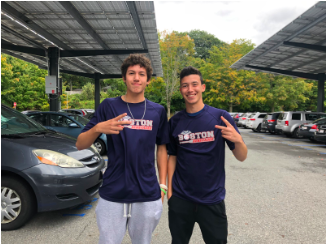
Senior Gavin Moser and junior Josh Schreiber sport their Boston Renegades team shirts.



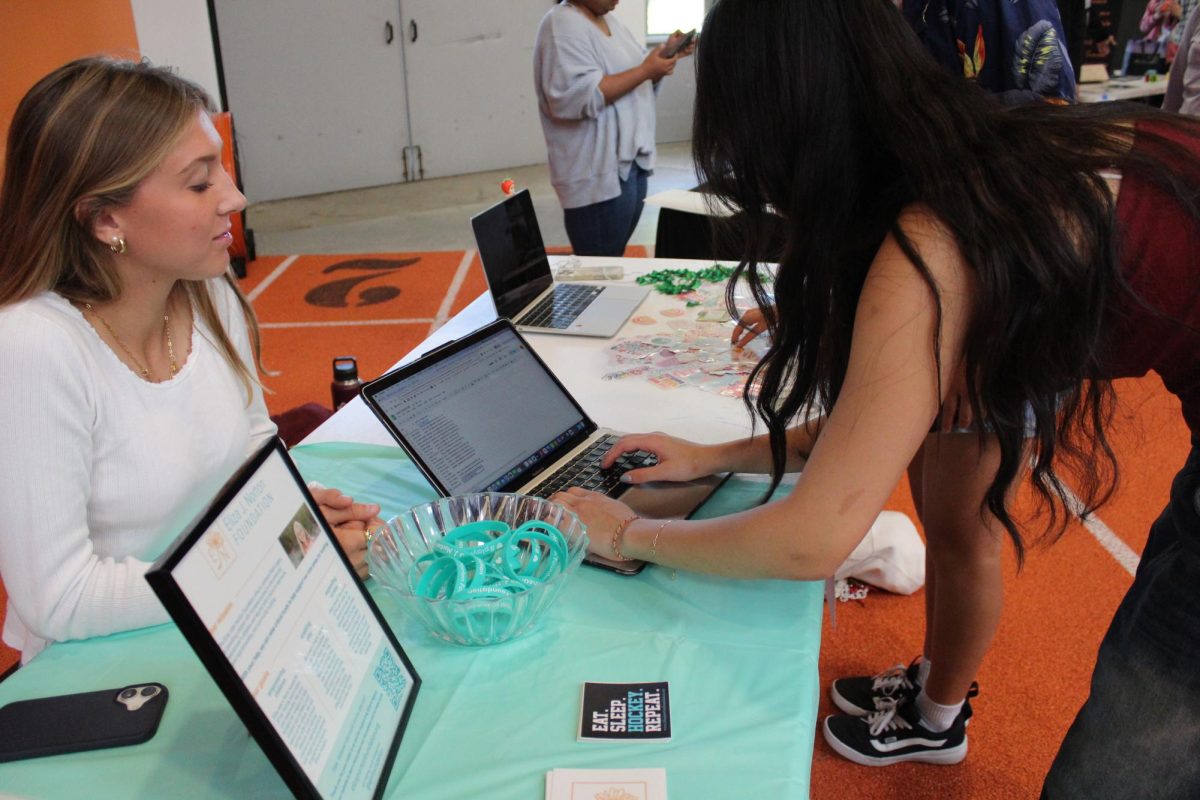






















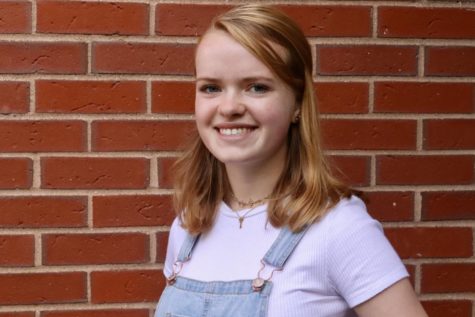
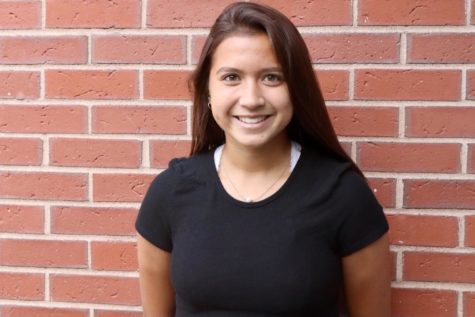
Rob Weissman • Oct 17, 2019 at 1:45 PM
Thanks for this great article! We are fortunate to have Gavin and Josh on the team. They helped us out a lot this year. Most importantly, they both made a difference in the community. They helped put smiles on people’s faces and they helped our team finish 3rd in the world!